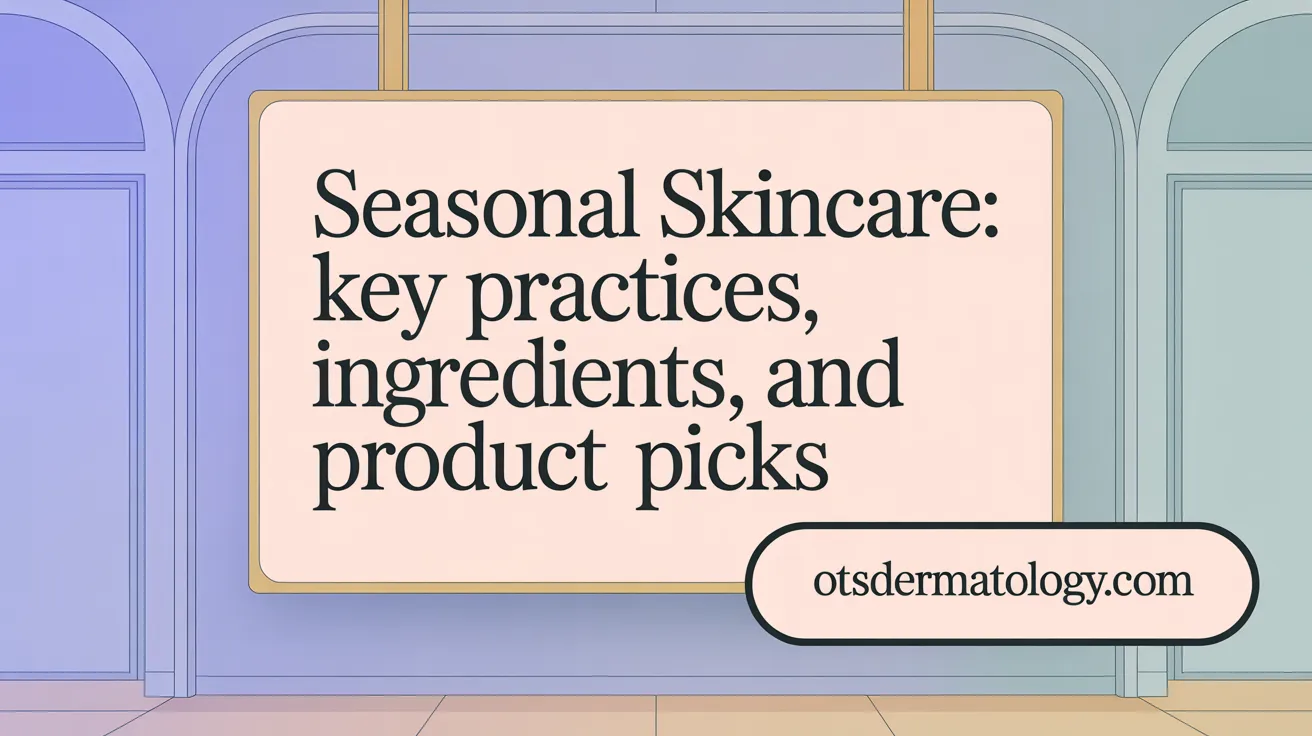Understanding Seasonal Impacts on Your Skin
Seasonal changes bring about distinct environmental shifts that profoundly influence skin health and its care needs. From the drying cold of winter to the humid intensity of summer, your skin's responses vary, necessitating thoughtful adjustments in your skincare routine. Understanding these effects and how to effectively transition your regimen between seasons can help maintain a balanced, healthy complexion year-round. This article explores how changing weather impacts skin, practical skincare adaptations, and expert tips to ensure smooth seasonal transitions for your skin health.
How Seasonal Changes Affect Skin Health and Common Skin Conditions
 Seasonal changes have a profound effect on skin health, driven by environmental factors such as temperature fluctuations, humidity levels, and sun exposure. In winter, colder air and indoor heating can strip moisture from the skin, weakening the skin’s natural barrier. This often leads to dryness, flaking, redness, and increased sensitivity, especially in exposed areas like lips, hands, and face. Using rich, hydrating moisturizers and applying them immediately after cleansing helps lock in moisture and restore the skin barrier (Winter skincare tips, moisturizers for dry winter skin, cream-based moisturizers for winter).
Seasonal changes have a profound effect on skin health, driven by environmental factors such as temperature fluctuations, humidity levels, and sun exposure. In winter, colder air and indoor heating can strip moisture from the skin, weakening the skin’s natural barrier. This often leads to dryness, flaking, redness, and increased sensitivity, especially in exposed areas like lips, hands, and face. Using rich, hydrating moisturizers and applying them immediately after cleansing helps lock in moisture and restore the skin barrier (Winter skincare tips, moisturizers for dry winter skin, cream-based moisturizers for winter).
During summer, higher temperatures and humidity cause the skin to produce more oil and sweat. This excess oil can clog pores, leading to breakouts and dullness. Neglecting sun protection during warmer months increases the risk of sunburn, pigmentation, and premature aging. Therefore, lightweight, oil-free cleansers, regular exfoliation, and broad-spectrum SPF 30 or higher are vital (summer skincare tips, broad-spectrum SPF use, managing summer breakouts).
Seasonal shifts can also exacerbate skin conditions such as eczema, psoriasis, and allergic reactions. For instance, dry winter air worsens eczema symptoms, while summer heat can trigger rashes and heat-related dermatitis. Proper routine adjustments—like switching to gentler cleansers in winter, incorporating barrier-strengthening ingredients, and maintaining hydration—are crucial. Consistently managing lip and overall skin hydration while protecting against environmental stressors helps maintain balanced skin throughout the year (seasonal skincare routine changes, hydrating products for sun exposure, using a humidifier for skin care).
In summary, understanding how environmental factors shift with the seasons allows for tailored skincare routines that protect, hydrate, and treat skin conditions effectively. This proactive approach prevents seasonal flare-ups and supports overall skin resilience (seasonal skin changes, changing your skincare routine).
Adapting Your Skincare Routine to Seasonal Weather Conditions
Changing weather conditions throughout the year require thoughtful adjustments to your skincare routine to maintain healthy, balanced skin. During the cold winter months, the air tends to be dry and low in humidity, especially with indoor heating. To combat this, it’s advisable to switch to richer, emollient moisturizers that contain moisturizing ingredients such as ceramides, shea butter, and hyaluronic acid. These help to reinforce the skin’s barrier, lock in moisture, and relieve dryness, flakiness, and irritation. It’s also important to continue applying a broad-spectrum SPF of 30 or higher daily, since UV rays can still penetrate clouds and snow reflect UV exposure, increasing the risk of skin damage.
In contrast, the hot and humid summer weather calls for lightweight, oil-free, water-based skincare products. These help to prevent clogged pores and reduce excess oil production caused by sweat and increased environmental heat. Daily application of a broad-spectrum SPF 30+ sunscreen is crucial to shield the skin from UV damage, which can cause pigmentation, premature aging, and skin cancers.
Transitioning seasons like spring and fall demand a balanced approach. Incorporate gentle exfoliation, using chemical exfoliants with AHAs or BHAs, to remove dead skin cells accumulated over winter and prepare the skin for upcoming environmental stresses. Adding antioxidant serums, such as vitamin C, supports the skin’s natural defenses against environmental pollutants and UV exposure. Furthermore, maintaining hydration with appropriate products helps keep the skin resilient and plump.
Overall, adapting your skincare products and routines to match seasonal conditions—richer emollients in winter, lightweight hydration in summer, and balanced treatment during spring and fall—is essential. This proactive approach ensures your skin remains healthy, protected, and radiant all year round.
Effective Tips for Smooth Skincare Transitions Between Seasons
 Adapting your skincare routine gradually as the seasons change is essential for maintaining healthy, radiant skin throughout the year. In preparation for colder months, start by incorporating richer, hydrating products such as hyaluronic acid serums, ceramide-rich creams, and nourishing oils to strengthen the skin barrier and lock in moisture. Limiting hot showers and using gentle, cream-based cleansers can prevent over-drying, especially when indoor heating is prevalent.
Adapting your skincare routine gradually as the seasons change is essential for maintaining healthy, radiant skin throughout the year. In preparation for colder months, start by incorporating richer, hydrating products such as hyaluronic acid serums, ceramide-rich creams, and nourishing oils to strengthen the skin barrier and lock in moisture. Limiting hot showers and using gentle, cream-based cleansers can prevent over-drying, especially when indoor heating is prevalent.
Conversely, transitioning to warmer weather calls for switching to lighter, water-based cleansers and oil-free, non-comedogenic moisturizers. These products help manage increased oil production and sweat, which can lead to breakouts. Daily broad-spectrum SPF 30 or higher should remain a staple, with reapplication every two hours when outdoors.
Gentle exfoliation—using chemical acids like AHAs or BHAs once a week—can effectively remove dead skin cells and prevent pore congestion that often worsens during seasonal shifts. This process promotes fresh, smooth skin and prepares your complexion for the upcoming weather.
Listening closely to your skin’s signals is vital. If your skin becomes more sensitive, dry, or oily than usual, adapt your routine accordingly and consider consulting a dermatologist for personalized guidance. By making these small, consistent adjustments, you can ensure a smoother, healthier transition between seasons and keep your skin glowing all year round.
Recommended Skincare Practices, Ingredients, and Products for Each Season
 Seasonal changes significantly influence skin health, requiring tailored seasonal skincare routines to maintain a luminous, healthy complexion throughout the year. In winter, the primary goal is to combat dryness induced by cold temperatures and indoor heating. Utilizing rich moisturizers containing ingredients such as ceramides, hyaluronic acid, and squalane helps reinforce the skin barrier and lock in moisture. Adding emollients like shea butter provides extra nourishment, preventing cracking and irritation, especially on sensitive areas like lips and hands.
Seasonal changes significantly influence skin health, requiring tailored seasonal skincare routines to maintain a luminous, healthy complexion throughout the year. In winter, the primary goal is to combat dryness induced by cold temperatures and indoor heating. Utilizing rich moisturizers containing ingredients such as ceramides, hyaluronic acid, and squalane helps reinforce the skin barrier and lock in moisture. Adding emollients like shea butter provides extra nourishment, preventing cracking and irritation, especially on sensitive areas like lips and hands.
As temperatures rise in summer, the focus shifts to protection and oil control. Lightweight, water-based, and oil-free skincare products are ideal to prevent clogged pores and breakouts. Incorporating antioxidants such as vitamin C serums neutralizes free radicals caused by intense sun exposure, pollution, and heat. Mineral-based sunscreens containing zinc oxide or titanium dioxide offer broad-spectrum UV protection without clogging pores. Additionally, mattifying powders and refreshing mists help manage excess oil and keep skin cool.
In spring and fall, transitional seasons require a balanced skincare approach. Ingredients like niacinamide enhance barrier function and reduce redness, while vitamin C serums brighten dull winter skin. Peptides support collagen synthesis, aiding in skin firmness and resilience. Hydrating botanicals like Aloe Vera soothe irritation and adapt to fluctuating humidity levels. Gentle exfoliation with acids like glycolic or salicylic helps remove dead skin cells, revealing a fresh, radiant glow. Across all seasons, water-based hydrators and soothing extracts help address environmental stressors and maintain optimal moisture levels.
A thoughtful combination of these practices, ingredients, and products tailored to each season's demands ensures resilient, radiant skin year-round. Regularly updating your routine to match seasonal shifts maximizes skin health and preserves a youthful, vibrant appearance.
Protecting Your Skin from Environmental Stressors Across Seasons
 Our skin faces various environmental challenges throughout the year, making proper protection essential for maintaining health and appearance. To safeguard skin from factors like sun exposure and dryness, it is crucial to adapt skincare routines seasonally.
Our skin faces various environmental challenges throughout the year, making proper protection essential for maintaining health and appearance. To safeguard skin from factors like sun exposure and dryness, it is crucial to adapt skincare routines seasonally.
Year-round, applying broad-spectrum sunscreen with an SPF of 30 or higher is fundamental, regardless of the weather, to prevent UV damage and premature aging. Wearing protective clothing, such as wide-brimmed hats, sunglasses, and UV-protective fabrics, further shields exposed skin from harmful rays.
In summer, the key is maintaining hydration through lightweight, hydrating moisturizers with ingredients like hyaluronic acid. Hot showers and excessive indoor heating can strip moisture from the skin, so it’s advisable to avoid very hot water and instead use lukewarm showers. Drinking plenty of water and incorporating antioxidant-rich serums helps bolster skin resilience against environmental stressors, such as pollution and intense sun exposure.
During winter, skin is particularly vulnerable to dryness caused by cold air and indoor heating. Richer creams with emollients like shea butter and ceramides help restore and lock in moisture. Using a humidifier indoors can add much-needed humidity to dry air, preventing skin from becoming flaky and irritated. Additionally, it’s important to limit over-exfoliation, which can weaken the skin barrier.
Managing pollution, allergens, chlorine exposure, and indoor irritants also plays a vital role. Wearing protective masks or avoiding outdoor pollution during peak times reduces exposure. After outdoor activities, thorough cleansing removes pollutants, while investing in skincare products designed to detoxify and repair the skin further enhances protection.
In summary, adjusting your skincare and protective measures to the seasonal environment—such as emphasizing hydration and barrier repair in dry months and UV defense during sunny days—helps maintain optimal skin health all year round.
Professional Treatments and Strategies for Maintaining Healthy Skin Year-Round
 To effectively preserve skin health through all seasons, a combination of professional treatments and preventive skincare strategies is essential.
To effectively preserve skin health through all seasons, a combination of professional treatments and preventive skincare strategies is essential.
Professional skin care options such as facials, chemical peels, and laser therapies can address specific seasonal concerns. Facials help boost hydration and remove impurities, especially after exposure to environmental stressors. Chemical peels can improve skin tone, reduce pigmentation, and reverse damage caused by sun exposure. Laser therapies, including fractional laser or IPL, are effective in reducing signs of aging and repairing sun damage, brightening the skin, and restoring an even complexion.
A consistent skincare routine forms the foundation of skin health year-round. This includes gentle cleansing, appropriate moisturization, targeted treatment serums like antioxidants and retinoids, and daily application of broad-spectrum sunscreen. During winter, incorporating hydrating ingredients like hyaluronic acid and occlusives such as ceramides helps combat dryness. Conversely, in summer, opting for lighter formulations and exfoliants like BHAs and AHAs can prevent clogged pores and manage excess oil.
Regular consultation with dermatologists ensures personalized advice tailored to individual skin needs and sensitivities. These professionals can recommend suitable treatments, skincare products, and adjustments based on seasonal changes.
Preventive measures are equally important. Wearing protective gear such as gloves and scarves during cold months prevents windburn and chapping. Continued use of SPF—even on cloudy days—protects against UV damage regardless of the season. Lip balms with SPF and nourishing hand creams help maintain the integrity of lips and hands.
Ultimately, a strategic combination of professional treatments and daily preventive care, adapted to seasonal demands, supports long-term skin vitality and resilience.
Maintaining Radiant Skin Through Every Season
Seasonal changes bring distinct challenges to skin health, requiring thoughtful adjustments to your skincare routine. By understanding how environmental factors impact your skin, adapting your products and practices accordingly, and protecting against sun damage and dryness, you can maintain a healthy, radiant complexion all year long. Incorporating professional treatments when necessary, staying attuned to your skin’s unique needs, and employing preventive measures will ensure smooth transitions through the seasons, promoting skin resilience and beauty regardless of the weather.
